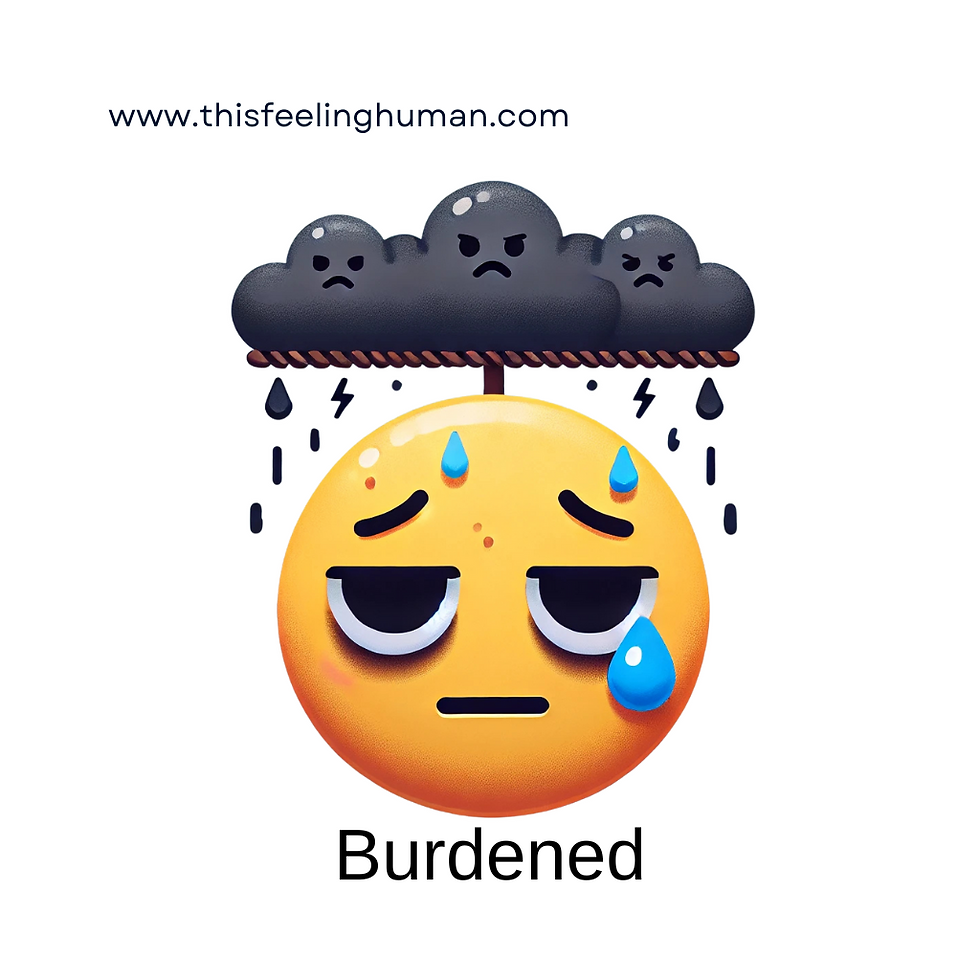The Story of Capable: Embracing Your Inner Strengths
- TFH

- Jan 8, 2025
- 6 min read
Updated: Jan 10, 2025
The Emotions Library project is a collection of stories about the emotion(s) we experience. Stories bring meaning and clarity, helping us understand our emotions better. We do this so everyone can access knowledge, gain emotional literacy, and develop self-awareness. Today, we’re exploring a feeling we all strive for but sometimes fail to recognize amidst the challenges of daily life—the empowering sense of competence, confidence, and readiness: capability.

Experiencing the feeling of being capable teaches us that readiness doesn’t require perfection or complete certainty—it thrives on trust in our ability to learn, adapt, and grow through challenges. Capability reminds us that our past experiences, even those we might overlook, equip us with the tools to tackle new tasks.
It also reveals that fear is not the enemy of action but can coexist with confidence, serving as a signal to prepare and engage. When we step into our capability, we set an example for others, inspiring trust and collaboration while fostering a ripple effect of collective success.
Additionally, the journey of feeling capable reminds us that resilience, adaptability, and self-belief are at the heart of growth, empowering us to embrace challenges and unlock our fullest potential.
Story: Feeling competent and confident in one’s abilities.
Impulse: Take on challenges or responsibilities.
Etymology: From Latin capabilis, meaning able to hold or grasp.
Purpose: Signals readiness to tackle new tasks or goals.
Emotional Regulation and Journaling
In partnership with Calm3D, we provide a safe space for self-regulation, where you can feel peace, safety, and security while reflecting on your emotional experience and experiencing your story of capability.
Visit www.playcalm3d.com as you reflect and experience peace as you contemplate your emotions.
Reflective Questions
1. What skills are helping you succeed right now?
2. How can you continue building on your strengths?
3. Who could benefit from your capabilities?
Let’s explore the empowering feeling of capability and how embracing it can help us take on challenges, foster resilience, and inspire confidence in ourselves and those around us.
Feeling Competent and Confident in One’s Abilities
Aiden had always been someone who stayed in the background. He excelled at his job as an assistant at a nonprofit, quietly managing spreadsheets, coordinating schedules, and ensuring everything ran smoothly. His team relied on him, but Aiden never thought of himself as a leader. He believed leadership was for people who were bold, charismatic, and unafraid of the spotlight—qualities he felt he lacked.

On Monday morning, his boss, Claire, pulled him aside. “Aiden,” Claire began, “I need you to step in for me at the community fundraiser this weekend. I know it’s short notice, but I trust you.”
Aiden froze. The fundraiser was the organization’s most important event of the year, involving major donors and local leaders. “Me?” he stammered. “I’ve never done anything like that.”
Claire smiled reassuringly. “You already know everything about the event. You’ve been the backbone of this project. Just be yourself—you’re more ready than you think.”
At first, Aiden was overwhelmed. He second-guessed his choices, questioned his worth, and feared failure. But as the week progressed, he began to recognize how his past experiences had subtly prepared him for this moment. Organizing community events, solving conflicts, and navigating tight deadlines had all equipped him with the skills he needed.
Gradually, these memories reinforced his confidence. Aiden began approaching the project not with fear of making mistakes but with curiosity and problem-solving energy. He didn’t have all the answers, but he trusted himself to figure them out.
Impulse: Taking on Challenges
The fundraiser arrived, and Aiden felt a mix of nerves and determination. As he greeted the guests, his voice wavered at first, but he soon found his rhythm. Questions about logistics came his way, and he answered them with clarity and confidence. When it was time for his speech, he took a deep breath and stepped up to the microphone.
“Good evening, everyone,” he began, his hands gripping the podium. As he spoke about the nonprofit’s mission and the impact of the donors’ contributions, he felt the room quiet, their attention focused entirely on him. For the first time, Aiden felt not just capable but powerful—he wasn’t just managing the event; he was leading it.
Aiden’s story illustrates how the feeling of capability inspires action. It’s that subtle yet powerful nudge that says, “I’ll try” instead of “I can’t.” Capability pushes us to step outside our comfort zones, knowing that growth lies on the other side of discomfort.
The Origins of ‘Capable’
The origin of the word “capable,” from the Latin capabilis, meaning “able to hold or grasp,” deeply resonates with Aiden’s journey. To be capable is to grasp—not only physically but also mentally and emotionally. Aiden’s ability to hold onto the complexity of the fundraiser, adapt, and manage it into something tangible was the essence of his capability.
Capability isn’t about innate talent—it’s about adaptability and resilience. You may not grasp everything all at once, but through practice and reflection, you develop the ability to hold onto more—be it skills, knowledge, or emotional understanding.
Purpose: Readiness to Tackle New Tasks or Goals
Aiden’s newfound capability was more than just a collection of skills—it was a profound internal signal of readiness. It was as though a switch had been flipped, signaling to him that he didn’t need to have all the answers upfront. Instead, readiness meant trusting himself to learn, adapt, and grow as challenges unfolded.
Feeling capable doesn’t eliminate fear. Aiden still experienced moments of uncertainty as he prepared for the fundraiser and even as he stood in front of the crowd. However, what had changed was his relationship with fear. Instead of allowing it to paralyze him, he used it as motivation to prepare, plan, and act. Capability assured him that while fear might always be present, it didn’t have to dictate his actions.

This readiness wasn’t just a private transformation; it became a signal to others. As Aiden stepped into his new role with determination, his confidence began to ripple outward. His teammates, who had previously seen him as a behind-the-scenes supporter, now looked to him as a dependable leader. They noticed his calm demeanor when troubleshooting issues, his clarity in communication, and his ability to remain composed under pressure.
Aiden’s readiness inspired trust. By exuding quiet confidence, he set the tone for collaboration and collective success. His team felt reassured knowing they could rely on him to guide the event to fruition. This wasn’t because Aiden was flawless, but because his readiness made others believe in his ability to handle whatever came his way.
What made Aiden’s readiness so impactful was its contagious nature. When one person displays capability, it often inspires those around them to do the same. Aiden’s calm, capable energy helped his team members feel more confident in their roles. This collective sense of readiness elevated the entire team’s performance, turning the fundraiser into a success that everyone could celebrate.
Emotional Literacy: How Awareness Enhances Your Sense of Capability
Capability is as much about emotional awareness as it is about action. Aiden’s journey highlights the role of emotional literacy in nurturing a sense of confidence.
Identifying Triggers: Aiden initially feared failure and judgment. Reflecting on these triggers allowed him to confront them and focus on his strengths.
Practicing Self-Compassion: Instead of criticizing himself for not being “perfect,” Aiden reminded himself that growth and learning were part of the process.
Celebrating Wins: Each step forward—successfully greeting guests, solving logistics, delivering his speech—reinforced his belief in his capabilities.
Affirmations: Aiden’s internal mantra became, “I’ve handled challenges before, and I can handle this too.”
By aligning his emotions with his actions, Aiden created a foundation for a capability that supported both his external achievements and internal well-being.
Reflective Questions

What skills are helping you succeed right now?
Like Aiden, what strengths have carried you through challenges? Are you resourceful, empathetic, or detail-oriented?
How can you continue building on your strengths?
Consider ways to nurture your capabilities, whether through learning, mentorship, or practice.
Who could benefit from your capabilities?
Capability is a resource to uplift others. Who might you mentor, support, or inspire with your unique abilities?
Closing Thoughts
Aiden’s journey is a reminder that capability is already within us—we often just need the opportunity to discover it. Capability isn’t about being fearless or perfect; it’s about trusting your ability to figure things out and grow through experience.
Each challenge faced is a step toward unlocking your potential for yourself and those you inspire along the way. By embracing your capabilities, you open yourself to the endless possibilities life offers.
If Aiden’s journey of discovering capability resonates with you, consider enhancing your emotional literacy to understand better and nurture this empowering feeling. Tools like Emoli Cards can help you identify and articulate your emotions, enabling you to transform self-doubt into opportunities for growth, resilience, and connection.
For personalized support, book an Emotions-Based Coaching session. Together, we’ll explore how embracing your capabilities can lead to greater self-awareness, stronger relationships, and a deeper sense of achievement, all while honoring your unique strengths and experiences.



Comments